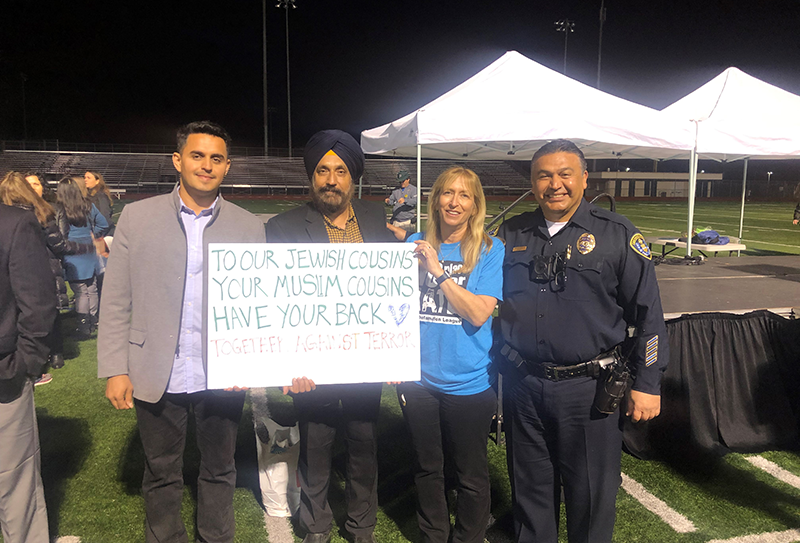
May 20, 2019
Hand-written on poster board were the following words: “To our Jewish cousins, your Muslim cousins have your back. Together against terror.”
The words on that poster board expressed some of the many moving and meaningful sentiments uttered, felt and shared at a community vigil in Poway, California the Monday following the horrific April attack at a synagogue where a woman was shot to death and three Shabbat worshippers injured by a terrorist allegedly inspired by white supremacist ideology. It was still hard to believe that on the six-month anniversary of a similar synagogue shooting in Pittsburgh, the U.S. Jewish community had been violated again.
Still mourning, over 4,000 people gathered at Poway High School stadium to stand together against hate. The bleachers at the football field were filled with students, parents, elected officials, law enforcement and individuals and leaders representing all faiths. Like the creators of the poster board, many people of different backgrounds showed solidarity with the Jewish community in ways both large and small.
Tammy Gillies, Director of ADL’s San Diego Regional Office, said that people streamed out of the stadium inspired and filled with hope that there is good in the world and that unity is a barrier to hate.
Less than a month after the shooting, how does a community begin to heal?
An opportunity for healing came this weekend. ADL’s San Diego Regional Office saw on Sunday an unprecedented turnout for its annual Walk Against Hate. Participants walked shoulder to shoulder at Liberty Station to send the strong message that the city is truly no place for hate.
On May 9, the Department of Justice filed federal hate crime charges against the alleged perpetrator of the April 27 deadly attack at the Chabad Poway synagogue. ADL applauded this development.
But the work to regain a sense of security is far from over.
Synagogues and Jewish institutions across the country are continuing to hold services and programs in solidarity with those killed and injured in the attack. Gillies said that synagogues in San Diego were packed at the Solidarity Shabbat services the first weekend of May and that almost every synagogue in the area had encouraged their congregants and guests to come out and to show resilience in the face of tragedy.
Synagogues and Jewish institutions are taking additional measures to evaluate short and long-term security needs of their communities. In San Diego, ADL and the FBI organized an active-shooter training, open to all Jewish community organizations and synagogues, to take place later this month. In June, the Jewish Communal Security Committee, a group hosted by ADL and comprised of local synagogues and Jewish agencies, will convene once again to work on security policies and practices. It has been meeting quarterly for over 15 years.
In addition to these measures, community strength so often builds from the comfort people provide to one another during times of grief. CBS News 8, a local San Diego TV station, hosted a town hall-style meeting on May 7 where parents and students expressed concerns about safety and mental health. ADL served as an expert on a panel, which addressed anti-Semitism and racism in schools.
On May 21, Jewish students and parents from public middle and high schools will gather at an event to talk about the Poway tragedy. At the event, ADL will discuss topics ranging from anti-Semitism to security and Jewish Family Service, a co-host, will provide counseling and discussion on mental health post-trauma.
This is a continuation of ADL’s partnership with Jewish Family Service, which jointly created a community support center for anyone who was a victim and feeling the emotional impact of that April day.
Gillies recalled the hardship, even after having worked at ADL for 12 years, of listening to children talk about how a man came into their synagogue, a sacred place of worship, and shot at them simply because they were Jews. While the pain of the victims, the witnesses and the entire community will remain for a long time, ADL continues to work to bring the community together, to support and improve safety and security, and to help in many ways to ease the pain of that horrible day.
Unfortunately, the tragedy of Poway only reveals that anti-Semitism remains a threat in 2019. ADL’s 2018 Audit of Anti-Semitic Incidents recorded a total number of 1,879 incidents, the third highest on record since ADL began tracking this data in the 1970s.
Assaults spiked by 105 percent since 2017. In addition to the attack in Pittsburgh, ADL recorded 248 anti-Semitic incidents (13% of the total number of incidents) attributed to known extremist groups or to individuals inspired by extremist ideology. And yet, perhaps the most alarming bit of information is the other side of the coin: 87% of these incidents were most likely committed by those unaffiliated with hate groups. In an environment where the number of acts remains at a near historic high, the conclusion is obvious: anti-Semitism is increasingly being normalized, an of expression of intolerance that simply is no longer taboo.
ADL will continue to fight the scourge of anti-Semitism and all forms of hate. Thank you to the thousands of participants in the Walks Against Hate – in San Diego, Philadelphia and Las Vegas – for joining us and the many others in these communities who stood up ready to stomp out the embers of hate before they spread.









